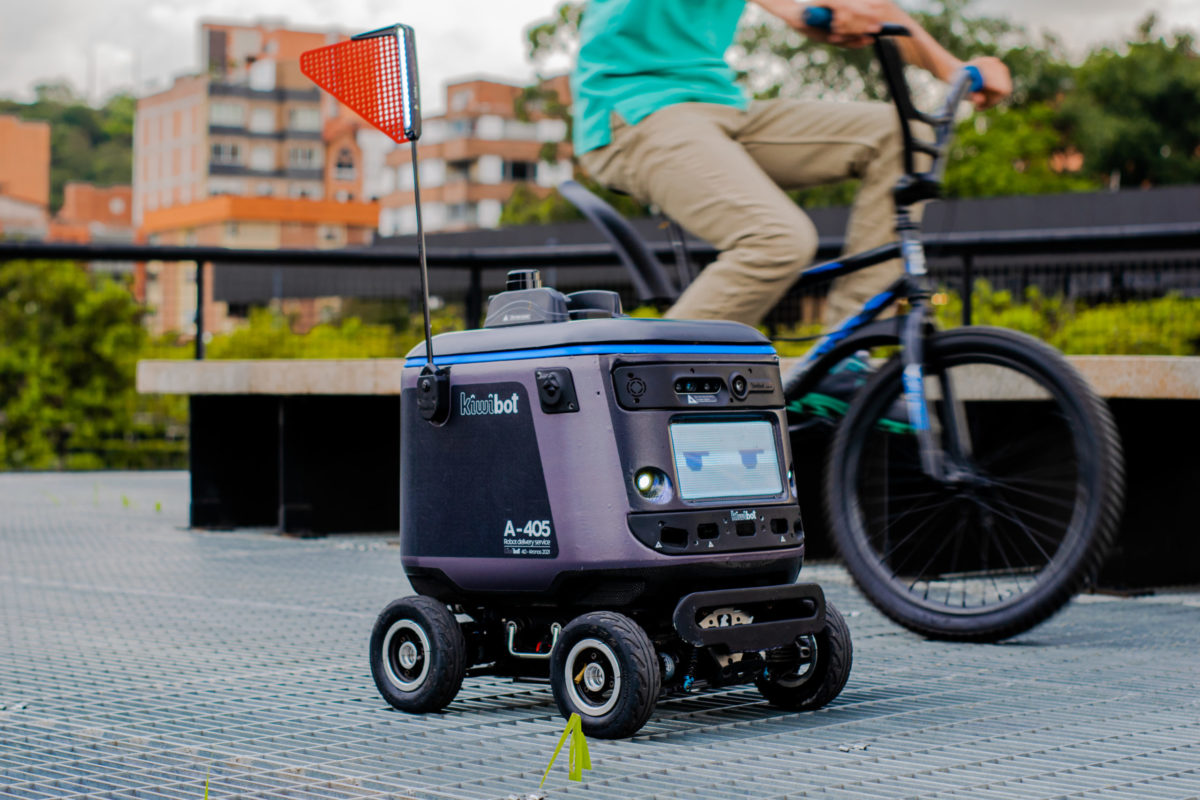Earlier this summer, some super cute delivery bots hit Pittsburgh streets.
Kiwibot — a robot delivery service company based out of Los Angeles and Medellín, Colombia — launched a pilot program in Bloomfield in June, and recently announced that it would have up to 10 robots operating in the neighborhood (an upgrade from the limit of two to three the company started with).
The electric robots are slow, traveling at a maximum speed of four miles per hour, and use sensors to detect obstacles, people and traffic lights as they navigate sidewalks. Kiwibots are also equipped with speakers and cameras to communicate with those relevant to a delivery. And, should something go awry, the semiautonomous robots can be controlled by a human operator located nearby.
Last spring, Kiwibot launched a new 4.0 model, doubling the number of orders the robots can carry at a time, and — most importantly — making an inner container large enough to hold a 12-inch pizza, as opposed to the 10-inch pizza size limit on the 3.3 robot models.
Despite some concerns expressed by Bloomfield residents in advance of the pilot program, Kiwibot Chief Operating Officer Diego Varela said the Pittsburgh launch has been “incredible.” Adding that the robots had been involved with a farmers market and other community events, as well as progress in establishing delivery relationships with local restaurants, Varela said the company has already learned a lot from the program that will help with future deployments.
“We’re just learning what the future might look like in terms of iteration and piloting of different things in different parts of the city,” he said. “We’ll come out of this after we’re done with the program with a lot of learnings that will inform how the city will treat this moving forward.”
As far as taking the robots beyond Bloomfield, Varela said that jurisdiction lies with the city, which the company has worked closely with throughout the pilot to determine new rules and regulations that might need to be in place for the personal delivery devices.
Kiwibot has launched in other cities as well, with the choices largely motivated by the company’s partnership with the Knight Foundation. That collaboration enabled Kiwibot to launch similar programs in Detroit, Miami and San Jose, where the foundation also operates.
In Pittsburgh, Varela described the pilot as having three main verticals: public work and collaboration with the city, community engagement with delivery customers, and corporate development with restaurant and other food service-related customers. The second of those three initiatives involve what Varela called “love dates” with the robots.
“We meet people out, whether it’s local [business] owners or customers or citizens that kind of want to meet the robots, who want to see what the experience looks like,” he said.
Beyond fitting right in with Pittsburgh autonomous transportation landscape, Varela added that the robots come with a host of other community benefits. They can save time and money for restaurants and consumers alike when it comes to food delivery, avoiding the high premiums of mainstream apps. But more importantly, in a hilly city like Pittsburgh that’s hard on bikers, the Kiwibot can help avoid “having a 400- to 500-pound car, powered by gas, deliver a burrito,” Varela said.
Keeping that environmental context in mind is important to the company’s mission. Though Kiwibots might only be feasible for relatively short-distance deliveries, that last-mile impact matters in the broader effort to be a sustainable company, argued Varela.
“We don’t see ourselves as the ultimate solver of all the problems,” he said. “We see ourselves as a part of an ecosystem, which involves electric cars, and electric motor transportation; it involves bicycle delivery, and so on and so forth.”
And so far, Pittsburgh seems welcoming to Kiwibots. Varela, like many other entrepreneurs and company executives before him, noticed a unique acceptance of new technology that the city has: “There’s a very big heart for the environment and technology — new things and innovation.”







